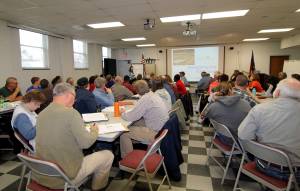Today every farm, large or small, needs to have a smart plan for ensuring food safety. “Good Agricultural Practices” or “GAP” certification is one way to put a plan in place. It has the added bonus of opening doors to markets that require GAP. But will GAP work in the small farm context? The answer increasingly is — yes!
This training will address how local farmers can achieve USDA Good Agricultural Practices (GAPs) certification (USDA GAP checklist), provide information on risks behind specific GAPs requirements, and outline logistics for preparing and scheduling a GAPs audit. The USDA GAPs certification program is an independent audit of produce suppliers that focuses on best agricultural practices to verify that fruits and vegetables are produced, packed, handled and stored in the safest manner possible to minimize risks of microbial food safety hazards.
Please email csmitchell@wakegov.com to register on a First Come First Serve basis while there still is space available.
EVENT DETAILS
Wake County
Wednesday, February 20, 2013 1:00 PM – 5:00 PM
NC Cooperative Extension, Wake County Office
4001-E Carya Dr, Raleigh, NC 27610-2914
Auditorium Rm 107
Contact: Carol Mitchell, 919-250-1094, csmitchell@wakegov.com
Presenters: Audrey Kreske, PhD and Katie Baros, MS
Agenda
1:00 pm Introductions
1:30 pm USDA GAP & GHP Audit Preparation and Scheduling
2:15 pm USDA GAP General Section
3:00 pm Break
3:15 pm USDA GAP Part One – Farm Review
4:00 pm USDA GAP Part Two – Field Harvest and Field Packing Activities
4:45 pm Wrap Up & Questions














